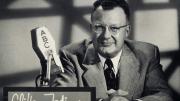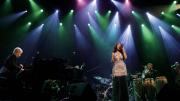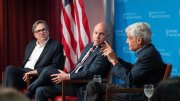For many Americans, Clifton Fadiman embodied books and learning in the twentieth century: Simon & Schuster editor; New Yorker book editor, National Book Awards host, Book-of-the-Month Club judge, and, switching media, radio and television quiz-show host. His daughter, Anne Fadiman ’74—no slouch herself as reporter, American Scholar editor, essayist, and now writing teacher at Yale (and an Incorporator of this magazine)—remembers him in The Wine Lover’s Daughter, a new memoir (Farrar, Straus and Giroux, $24). The title’s origin becomes clear from the vivid opening:
My father was a lousy driver and a two-finger typist, but he could open a wine bottle as deftly as any swain ever undressed his lover. Nearly every evening of my childhood, I watched him cut the capsule—the foil sleeve that sheathes the bottleneck—with a sharp knife. Then he plunged the bore of a butterfly corkscrew into the exact center of the cork, twirled the handle, and, after the brass levers rose like two supplicant arms, pushed them down and gently twisted out the cork. Its pop was satisfying but restrained, not the fustian whoop of a champagne cork but a well-bred thwick. He once said that the cork was one of three inventions that had proved unequivocally beneficial to the human race. (The others were the wheel and Kleenex.)
If the wine was old, he poured it into a crystal decanter, slowing at the finish to make sure the sediment stayed in the bottle. If it was young, he set the bottle in a napkin-swathed silver cradle to “breathe”: one of several words, along with “nose” and “legs” and “full-bodied,” that made wine sound more like a person than a thing. Our food was served—looking back, I can hardly believe I once accepted this as the normal order of things—by a uniformed cook who ate alone in the kitchen and was summoned by an electric bell screwed to the underside of the dinner table just above my mother’s right knee. But my father always poured the wine himself. The glasses were clear and thin-stemmed, their bowls round and generous for reds, narrow and upright for whites. (Had he lived long enough to see Sideways, he would immediately have recognized that the wine-snob hero was seriously depressed: only thoughts of suicide could drive someone to drink a Cheval Blanc ’61 from a Styrofoam cup.) My father swirled the wine, sniffed it, sipped it, swished it, and, ecstatically narrowing his eyes, swallowed it—a swallow that, as he put it, led “a triple life: one in the mouth, another in the course of slipping down the gullet, still another, a beautiful ghost, the moment afterward.”
…[T]hat erotically charged description is from a 1957 essay called “Brief History of a Love Affair.” When I was ten or so, I spotted the title in the table of contents in one of his books, eagerly flipped to page 133, and was grievously disappointed to discover, in the fourth paragraph, that the lover in question was not a woman but a liquid.








